In the heart of Nigeria’s vibrant capital city, Abuja, stands a diplomatic institution that symbolizes the longstanding relationship between Nigeria and the United States. The US Embassy in Nigeria serves as a testament to the deep-rooted ties that connect these two nations, spanning decades of collaboration, mutual respect, and shared aspirations.
As a focal point for diplomacy, cultural exchange, and cooperation, the embassy plays a pivotal role in strengthening the bonds between the United States and Nigeria.
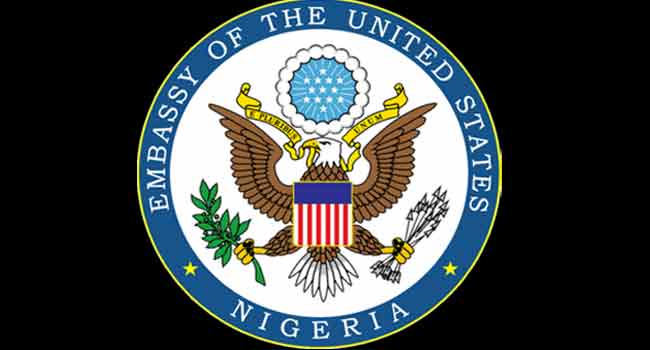
In this article, we will delve into the multifaceted role of the US Embassy in Nigeria, exploring its impact on bilateral relations, cultural exchange, and the promotion of shared values.
Through a closer examination of its initiatives, services, and diplomatic engagements, we will shed light on the invaluable contributions made by the embassy in nurturing the enduring partnership between the United States and Nigeria.
Read Also: A List of 369 Oklahoma Zip Code in the United States
US Embassy in Nigeria
Since its establishment, the US Embassy in Nigeria has served as a conduit for fostering diplomatic relations, promoting economic partnerships, and advancing shared values between the American and Nigerian people.
The embassy’s commitment to facilitating dialogue and understanding has facilitated extensive engagement in areas such as trade, security, education, and development, bolstering both nations’ interests.
Beyond its diplomatic functions, the US Embassy in Nigeria stands as a gateway for Nigerians aspiring to study, work, or visit the United States. It plays a crucial role in supporting educational and cultural exchanges, granting visas, and providing consular services to Nigerian citizens.
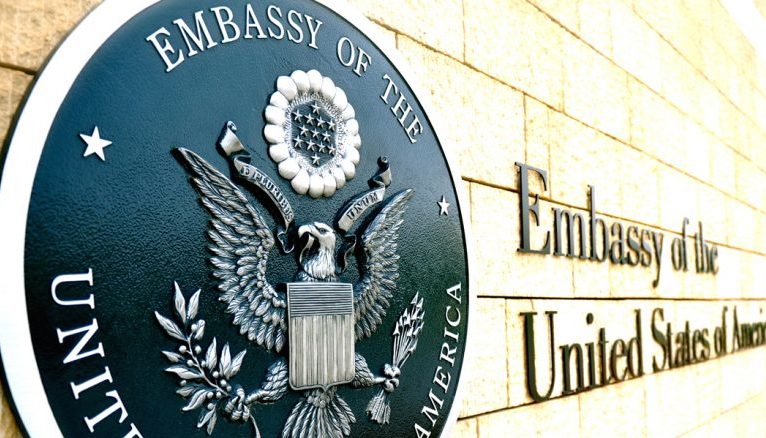
Moreover, the US Embassy in Nigeria serves as a vibrant centre for fostering people-to-people connections and cultural understanding. Through various programs and initiatives, the embassy promotes artistic, academic, and intellectual exchanges, showcasing the diversity and richness of American culture to the Nigerian public.
This cultural exchange not only broadens horizons but also helps to foster mutual respect, tolerance, and appreciation for the similarities and differences between our two nations.
However, the United States Embassy’s role extends far beyond the capital city. With consulates located in Lagos and other major Nigerian cities, the embassy ensures that its services and engagement reach a wider audience across the country.
As Nigeria continues to navigate a complex geopolitical landscape and strive towards its developmental goals, the US Embassy in Nigeria remains steadfast in its commitment to supporting Nigeria’s progress.
Read Also: Scholarships in Canada for International Students 2023
How many visas were issued by the US Embassy in Nigeria
The US Department of State has provided immigration data that reveals the number of visas issued within a specific period but does not disclose the number of applications submitted.
From 2011 to 2020, Nigerians received a total of 74,068 immigrant visas. The highest number of visas issued in a single year was recorded in 2013, with a total of 9,782 visas granted.
However, there has been a decline in the number of immigrant visas issued since 2018, when 7,922 Nigerians were granted visas. This number further dropped to 6,746 in 2019 and significantly decreased to 3,677 in 2020. Immigrant visa holders are individuals who are permitted to work under specific conditions outlined by their visa type.
In contrast, non-immigrant visas (such as business and tourism visas) have been issued to a larger number of Nigerians, totalling 1.17 million. However, a report by the US Department of Homeland Security indicates an overstay rate of 11.16 per cent in 2019.

In 2021 alone, the United States issued 4,626 immigrant visas and 22,841 non-immigrant visas to Nigerians. It is worth noting that a notice on the State Department website advises against comparing monthly reports from different years due to changes in methodology.
Nonetheless, the number of immigrant visas granted thus far in 2021 surpasses the total issued in 2020, which can potentially be attributed to the impact of the COVID-19 pandemic.
Analyzing the top five immigrant visas granted to Nigerians, of the 4,626 immigrant visas issued in 2021, the highest number (1,002) were granted to children of US citizens. Visas for spouses of US citizens followed closely with 910 issued, while 588 conditional visas were granted to spouses of US citizens.
Read Also: The Albukhary International University Scholarship
What is a US Visa?
A US visa is an official document issued by the US government that allows foreign individuals to enter the United States for various purposes, such as tourism, business, education, employment, or to reside permanently as an immigrant. It is typically a stamp or sticker placed on the passport of the visa holder.
There are two main categories of US visas: immigrant visas and non-immigrant visas.
Immigrant Visas: Immigrant visas are intended for individuals who plan to live permanently in the United States. They are commonly obtained through family-based petitions and employment-based petitions.
Or as a result of certain humanitarian or diversity visa programs. Immigrant visas grant the holder the ability to live, work, and study in the United States permanently, and they may eventually lead to acquiring US citizenship.
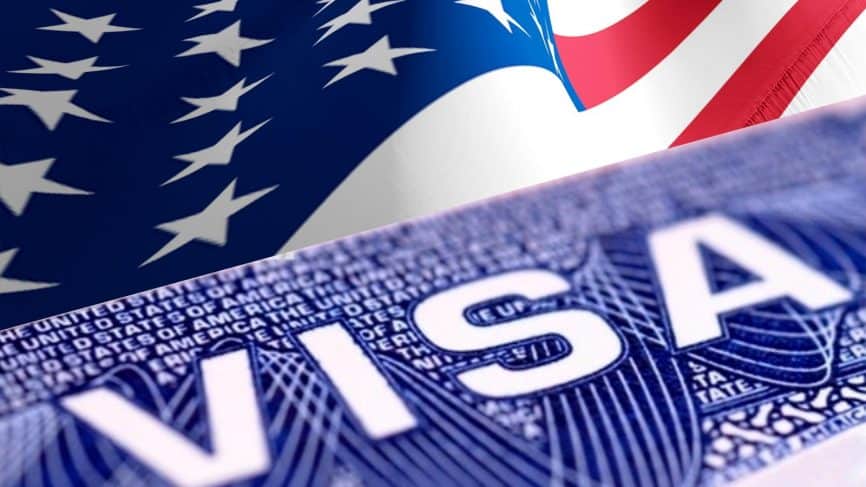
Non-Immigrant Visas: Non-immigrant visas are temporary visas that allow individuals to visit the United States for a specific purpose and duration. These visas are usually granted for activities such as tourism, business meetings, studying, temporary employment, medical treatment, or participating in cultural exchange programs.
Non-immigrant visas have various classifications, including B visas for tourism or business, F visas for students, H visas for temporary workers, J visas for exchange visitors, and many others, each serving a specific purpose.
Obtaining a US visa generally requires an application process that involves completing a visa application form, providing supporting documents, paying the required fees, and attending an interview at a US embassy or consulate in the applicant’s home country.
The visa application process aims to determine the eligibility of individuals to enter the United States based on the purpose of their visit, their ties to their home country, and their ability to financially support themselves during their stay.
Read Also: The Japa Syndrome: Where is Everybody Running To?
Canada Visa from Nigeria
After analyzing data provided by Immigration, Refugees and Citizenship Canada (IRCC), the department responsible for immigration into Canada, refugees, and Canadian citizenship,
We found no evidence of an ‘astronomical increase’ in the number of Nigerians granted Canadian visas when comparing the years from 2018 to 2021 (September). In 2018, Nigerians submitted 15,801 applications for Canadian permanent resident visas, and authorities granted only 10,225 (64.7 per cent) of them.
During the same year, Nigerians also submitted 88,957 applications for temporary resident visas, and 40,701 visas were issued, representing 45.7 per cent.
By 2019, applications from Nigerians for permanent resident visas increased to 18,774, and 12,699 (67.6 per cent) were granted visas. Applications for temporary resident visas rose to 115,400, with 42,511 (36.8 per cent) being issued.
Due to the COVID-19 pandemic, the number of applications for permanent resident visas decreased in 2020. Only 16,971 Nigerians applied, and 7,207 (42.4 per cent) were granted visas. There were 69,348 applications for temporary residents, and 28,071 (40.4 per cent) received visas.
Comparing the first nine months of previous years (2018 to 2021), a noticeable trend emerges. In 2018, 31,865 temporary resident visas were issued to Nigerians, while 8,077 received permanent resident visas.
The numbers increased in 2019 within the same period, with 32,431 temporary resident visas and 10,290 permanent resident visas granted.
In 2020, the number of temporary resident visas granted decreased to 20,700 when the COVID-19 pandemic struck. The number of permanent resident visas plunged by 65 per cent, with only 3,628 visas granted. In 2021, the number of visas issued was higher than in 2020 but lower than in 2019 and part of 2018.
UK Visa from Nigeria
In 2018, Nigeria submitted a total of 129,765 visa applications to the UK. Of these, authorities issued 82,489 visas, while 47,219 applications were rejected. Data is also available for applications that lapsed or were withdrawn.
Out of the 82,489 visas granted, only 3,726 were categorized as work-related visas, and 551 work-related applications were refused.
The number of applications increased in 2019 to 155,403, with 108,116 visas issued and 45,941 refused. Among the visas granted, 5,162 were for work-related purposes, and 552 work-related applications were refused.
However, in 2020, the total number of applications decreased to 81,333. Out of these, 56,528 visas were granted, while 25,391 applications were refused. Among the refusals, 5,514 were for work-related visas, and 177 work-related applications were rejected.
From January to September 2021, Nigeria submitted 109,025 visa applications to the UK. Out of these, 74,131 visas were issued, and 28,858 applications were refused. Within the visas granted during this period, only 7,877 were work-related visas, and 288 work-related applications were rejected.
In conclusion, the data and analysis regarding the US Embassy in Nigeria provide valuable insights into visa trends and patterns. The information reveals the number of immigrant and non-immigrant visas issued to Nigerians over the years, shedding light on changes and fluctuations in visa grants.
From 2011 to 2020, the number of immigrant visas issued to Nigerians declined, with notable decreases since 2018. On the other hand, non-immigrant visas were issued in larger quantities but with an overstay rate reported in 2019.
Read Also: How To Get A Nigerian Visa
Nonimmigrant Visa Issuance Fiscal Years Analysis
Analysis of African Countries and Top World Countries Fiscal Year 2022
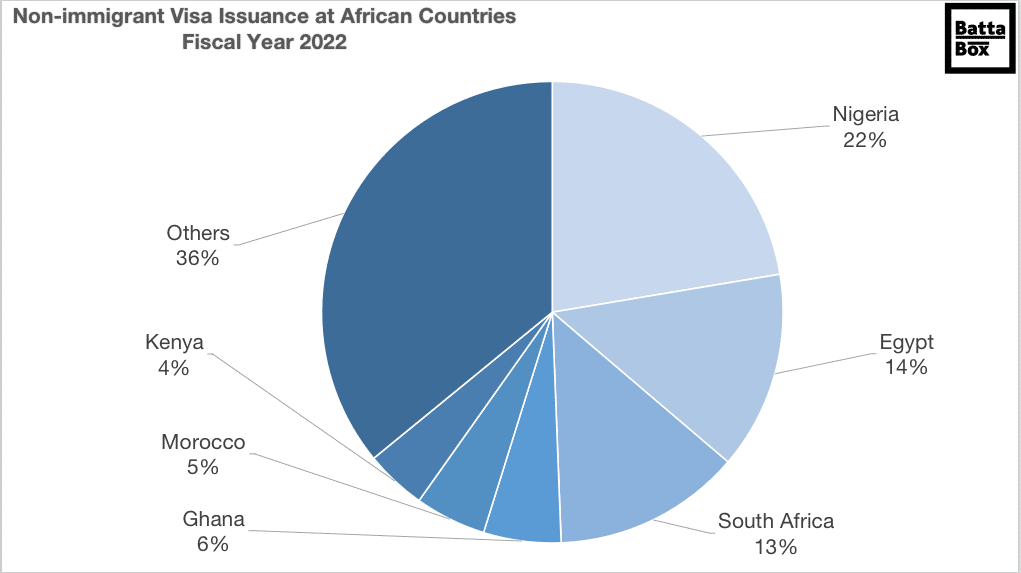
In fiscal year 2022, a total of 6,815,120 nonimmigrant visas were issued across various countries. Among them, Mexico received the highest number of visas, with 1,728,613 issued to individuals from Mexico. This accounted for approximately 25% of the total visa issuances. India followed with 764,966 visas issued, representing around 11% of the total. Brazil ranked third, receiving 695,575 visas, making up about 10% of the total.
Nigeria, Great Britain, and Northern Ireland received a relatively smaller number of visas, with 84,557 and 77,759 visas issued, respectively, accounting for approximately 1% each. Australia had even fewer visas issued, with 31,825, representing around 0.5% of the total.
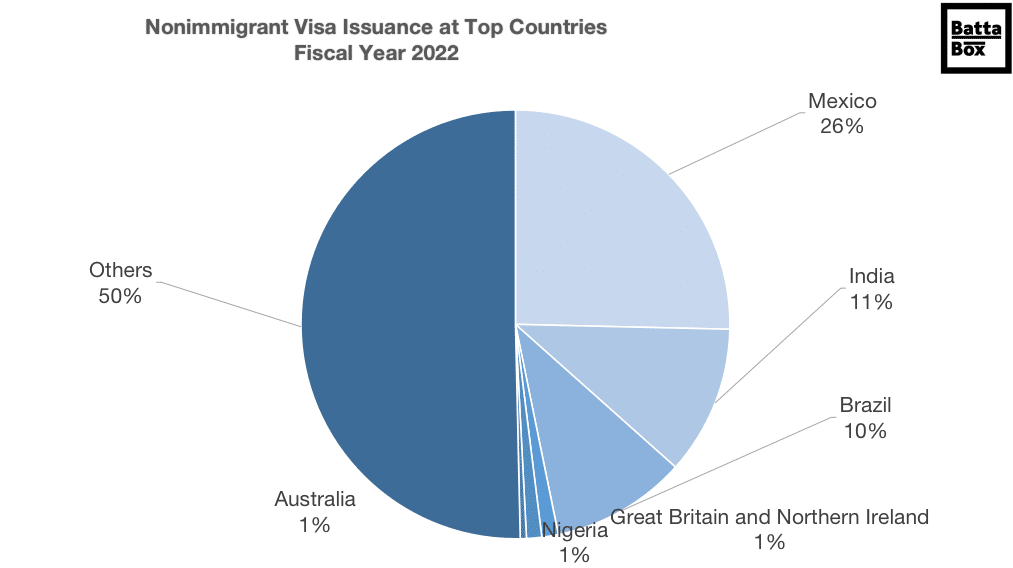
The category “Others” represents all countries not individually listed in the data. These countries collectively received a significant portion of the visas, with 3,431,825 issued, making up approximately 50% of the total visa issuances.
Overall, these figures provide an overview of the distribution of nonimmigrant visas across different countries in the fiscal year 2022, highlighting each country’s varying levels of visa issuances.
Read Also: International Scholarships for Nigerian Students
Analysis of African Countries and Top World Countries Fiscal Year 2021
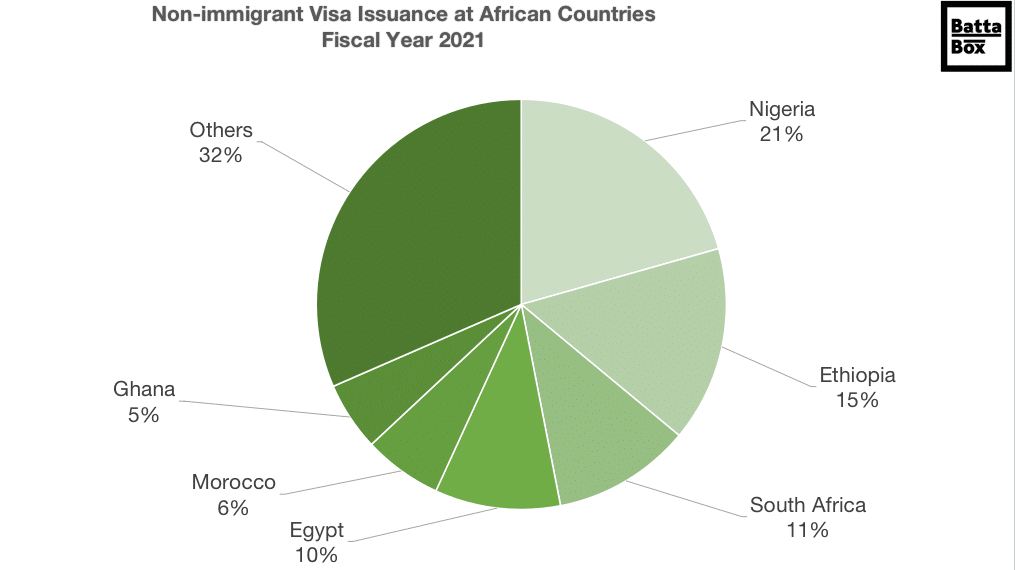
During fiscal year 2021, a total of 2,792,083 nonimmigrant visas were issued across various countries. Among these countries, Mexico had the highest number of nonimmigrant visas issued, with 910,790 visas granted. This accounted for approximately 33% of the total visa issuances. India followed closely, with 276,506 visas issued, representing around 10% of the total.
Nigeria, Germany, and Australia had relatively smaller numbers of visas issued. Nigeria received 24,726 visas, making up approximately 1% of the total. Germany had 27,883 visas issued, also accounting for approximately 1% of the total. Australia received 14,238 visas, representing around 1% as well.
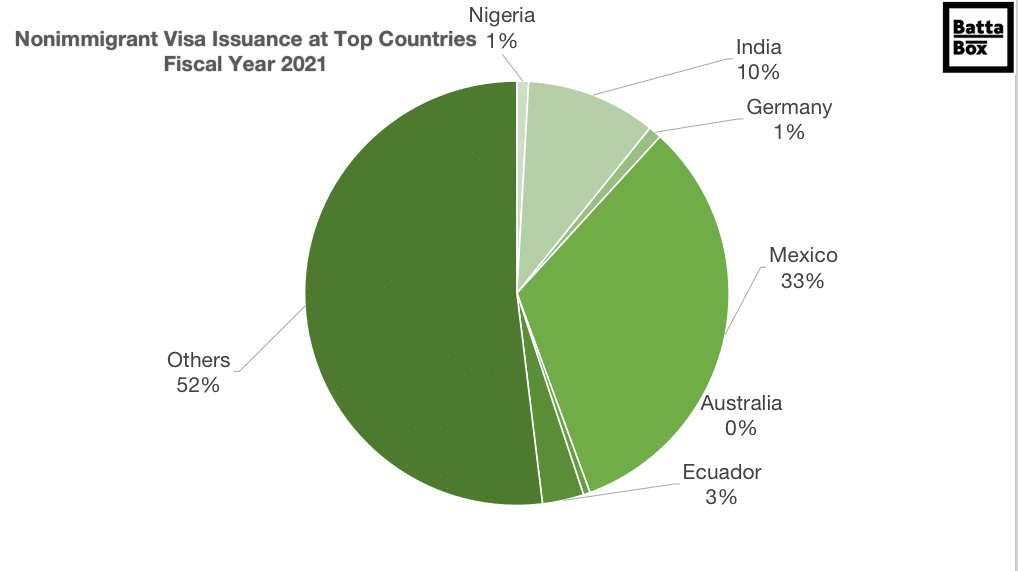
Ecuador received a significant number of nonimmigrant visas, with 88,050 visas issued, making up approximately 3% of the total visa issuances.
The remaining countries, categorized as “Others,” collectively received 1,449,890 nonimmigrant visas, accounting for approximately 52% of the total visa issuances.
These figures provide an overview of the distribution of nonimmigrant visas across different countries in the fiscal year 2021, highlighting each country’s varying levels of visa issuances.
See: Top 20 Countries To Go For Vacations Around the World In 2023
Analysis of African Countries and Top World Countries Fiscal Year 2020
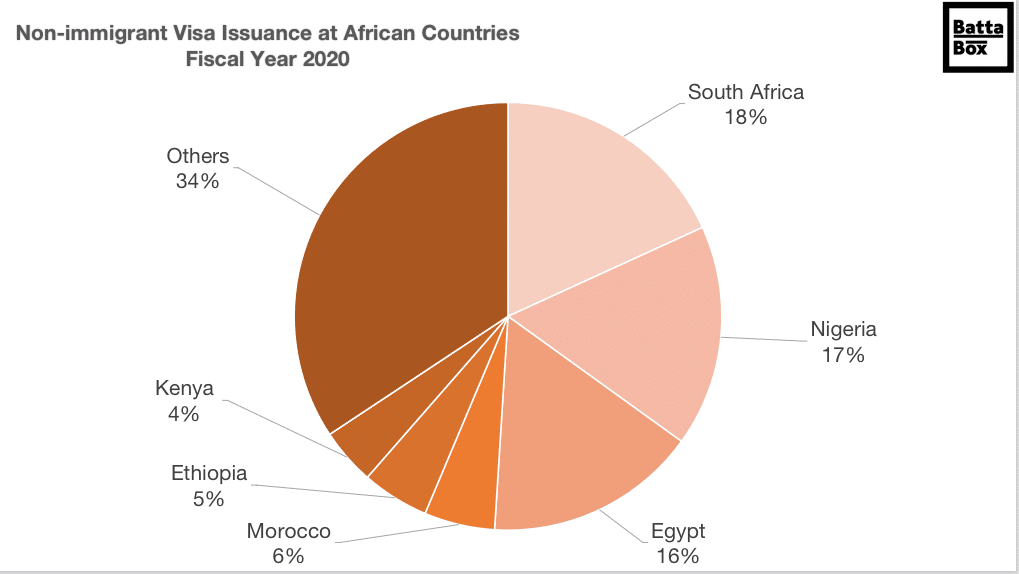
In fiscal year 2020, a total of 4,013,210 nonimmigrant visas were issued across various countries. Among these countries, Mexico received the highest number of nonimmigrant visas, with 960,095 visas granted. This accounted for approximately 24% of the total visa issuances. India followed closely, with 499,213 visas issued, representing around 12% of the total.
Brazil received a significant number of nonimmigrant visas, with 242,211 visas issued, making up approximately 6% of the total visa issuances. Russia had 85,290 visas issued, accounting for approximately 2% of the total.
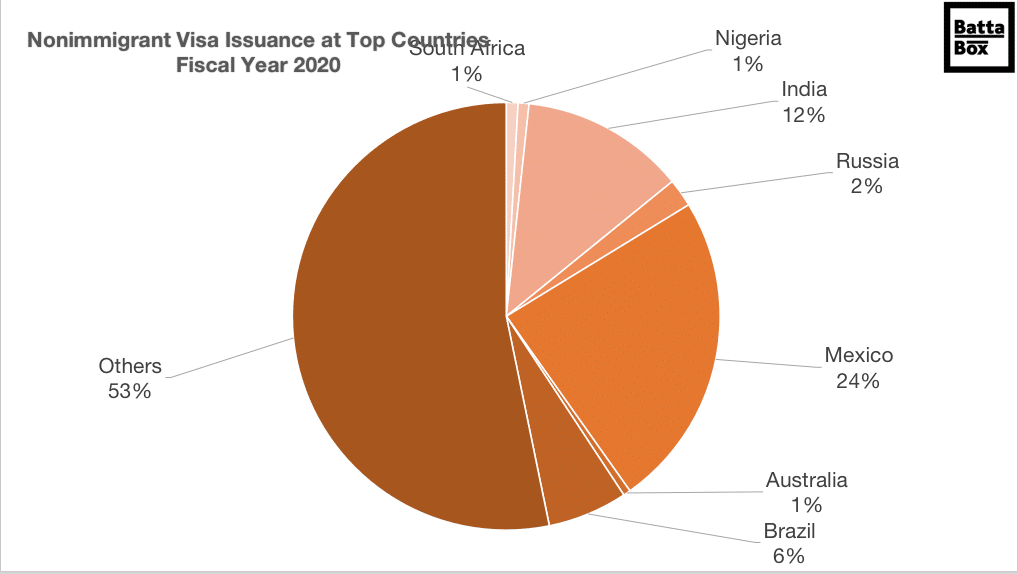
South Africa, Nigeria, and Australia had relatively smaller numbers of visas issued. South Africa received 35,550 visas, Nigeria had 32,787 visas, and Australia received 22,005 visas. Each of these countries accounted for approximately 1% of the total visa issuances.
The remaining countries, categorized as “Others,” collectively received 2,136,059 nonimmigrant visas, accounting for approximately 53% of the total visa issuances.
These figures provide an overview of the distribution of nonimmigrant visas across different countries in the fiscal year 2020, highlighting each country’s varying levels of visa issuances.
See: How to Position for International Jobs
Analysis of African Countries and Top World Countries Fiscal Year 2019
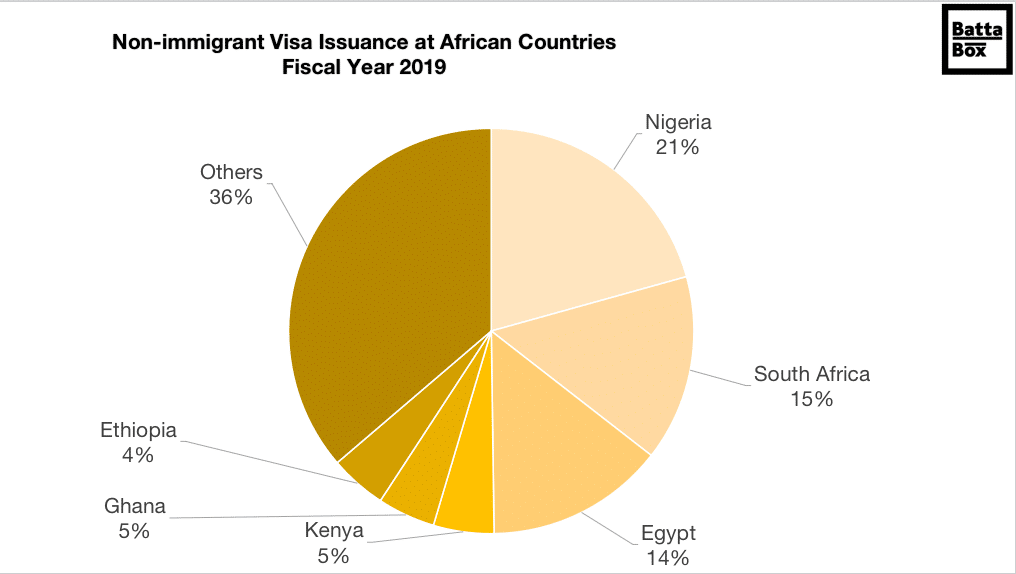
During fiscal year 2019, 8,742,068 nonimmigrant visas were issued across various countries. Among these countries, Mexico had the highest number of nonimmigrant visas issued, with 1,471,148 visas granted. This accounted for approximately 17% of the total visa issuances. China – mainland followed closely, with 1,255,992 visas issued, representing around 14% of the total.
Brazil received a significant number of nonimmigrant visas, with 625,856 visas issued, making up approximately 7% of the total visa issuances. Russia had 179,905 visas issued, accounting for approximately 2% of the total.
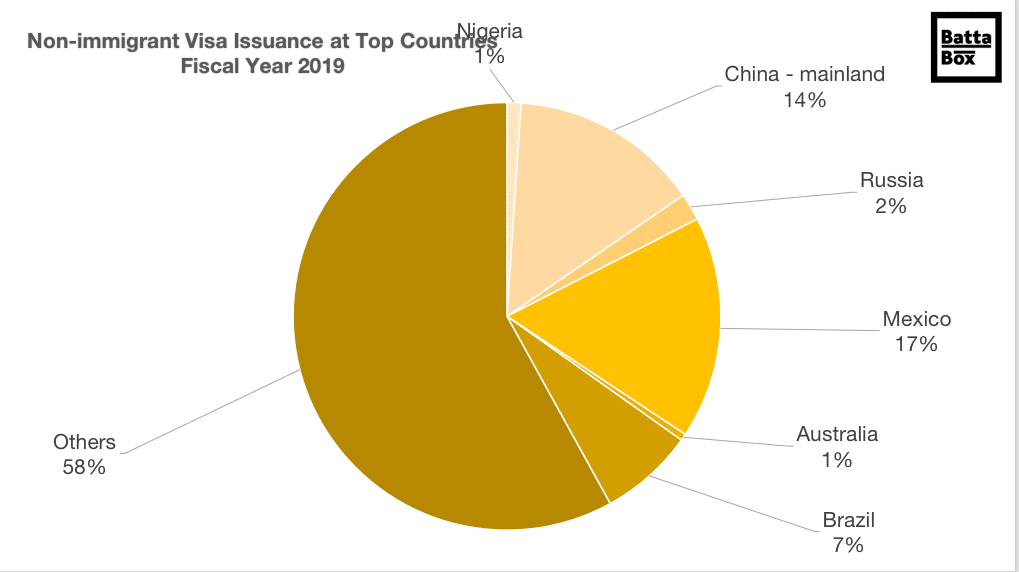
Nigeria, Australia, and other countries had relatively smaller numbers of visas issued. Nigeria received 92,471 visas, accounting for approximately 1% of the total. Australia had 44,681 visas issued, also representing around 1% of the total.
The remaining countries, categorized as “Others,” collectively received 5,072,015 nonimmigrant visas, accounting for approximately 58% of the total visa issuances.
These figures provide an overview of the distribution of nonimmigrant visas across different countries in the fiscal year 2019, highlighting each country’s varying levels of visa issuances.
Read Also: How Best To Get Scholarships In The UAE (Dubai) (2023/2024)
Is the US Embassy Making More Profits in Nigeria?
It is important to approach such a claim with caution and consider various factors that may contribute to this situation.
Firstly, it is essential to understand that the decision-making process for granting visas involves multiple factors, including immigration policies, security concerns, and individual applicant qualifications. It is unlikely that embassy profits alone would be the sole determinant in visa issuance.
There could be other reasons for a decrease in the number of US visas granted in Nigerian embassies. For instance, changes in visa application processes, stricter immigration policies, or an increase in the number of applicants who do not meet the eligibility criteria could all contribute to a decline in visa approvals.
Moreover, exploring the context surrounding the claim of increased profits is necessary. While embassies are expected to generate revenue through consular services, it is crucial to ensure that profit-seeking motives do not compromise the integrity and fairness of the visa application process.
Visa decisions should be based on objective assessments of an applicant’s eligibility and adherence to the established guidelines.
Drawing a direct causal relationship between embassy profits and visa issuance can be challenging without comprehensive data and analysis. It is important to consider multiple factors, including immigration policies, security concerns, and applicant qualifications, when examining changes in visa approval rates.
Transparency, fairness, and adherence to established guidelines should be the foundation of any visa application process.
Related Article: Academic Scholarships Programs for International Students
Total NIV visas issued
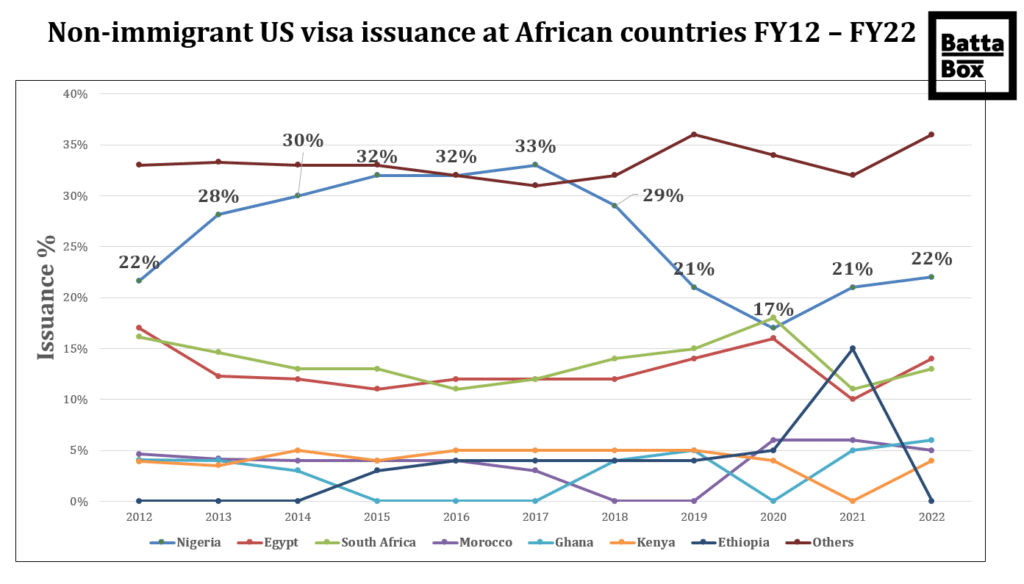
B-Visas Denials
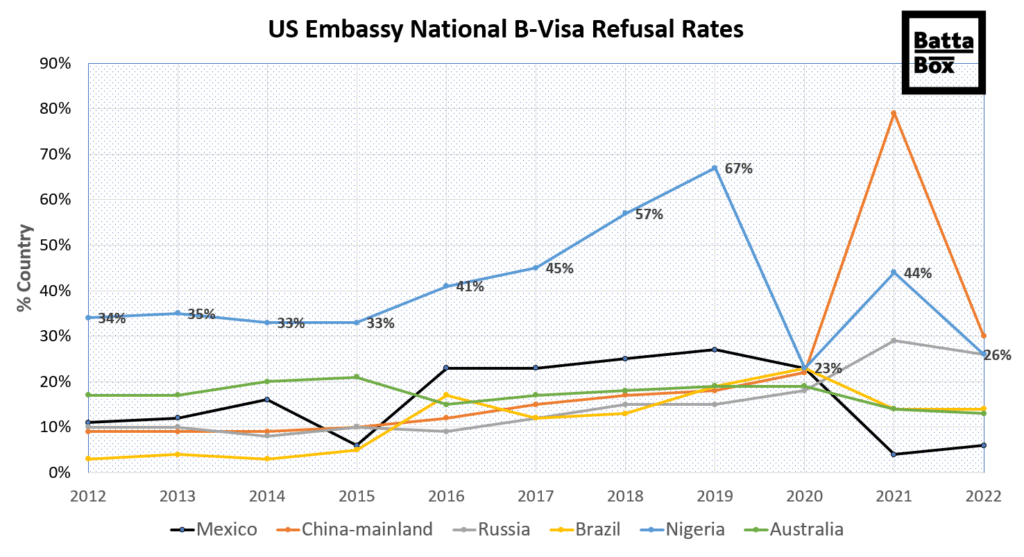
Overstay rates
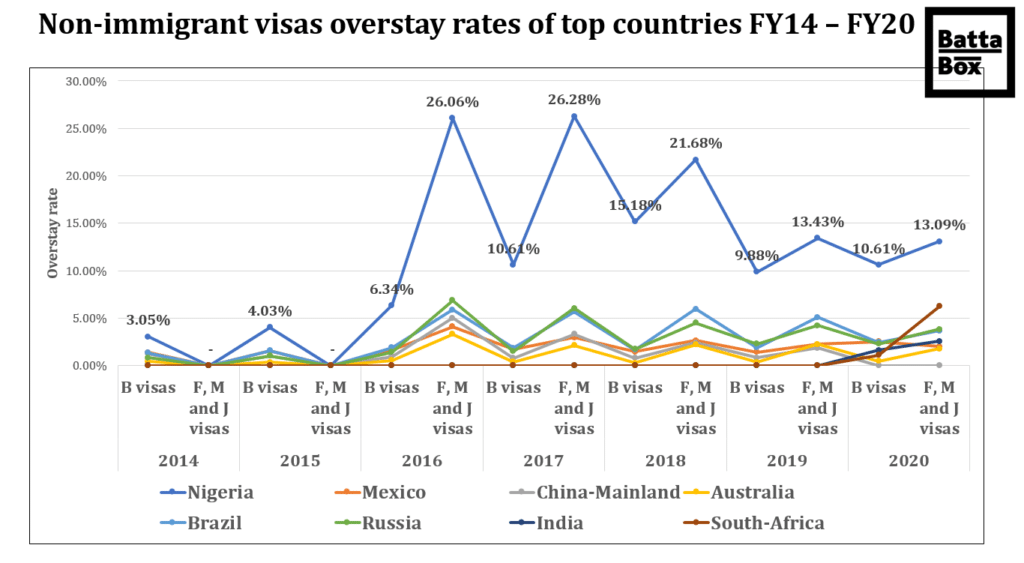
Top Visa Issued countries
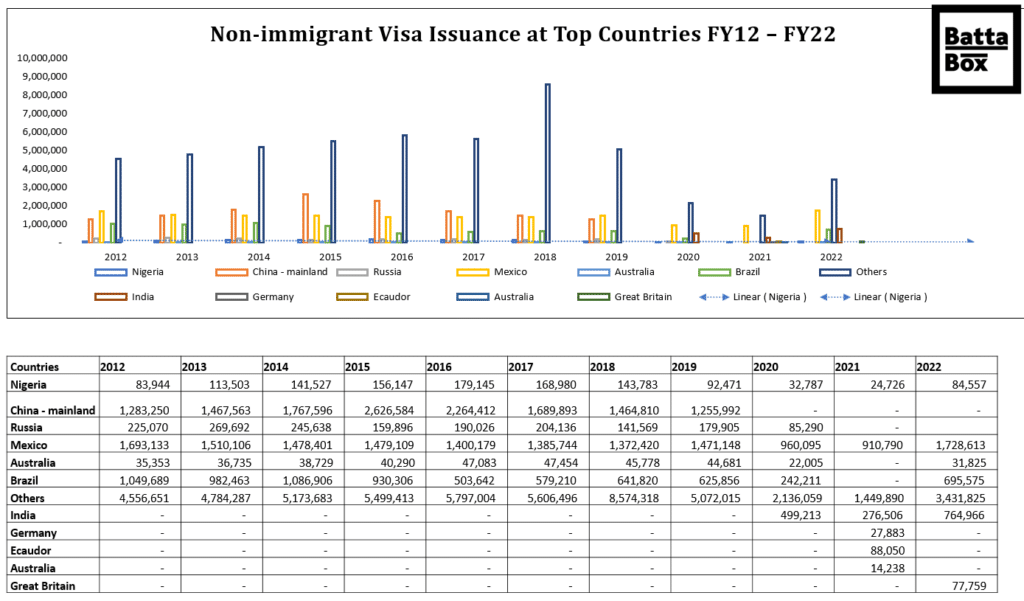
Conclusion
Various factors, including diplomatic relations, economic ties, travel restrictions, political situations, and visa policies of the respective countries, typically influence nonimmigrant visa issuances. The number of nonimmigrant visas issued can fluctuate from year to year due to changes in these factors.
For countries like Mexico, India, Brazil, and Nigeria, which had significant numbers of nonimmigrant visas issued in the data provided above, it is common to see variations in visa issuance based on factors such as economic opportunities, education, tourism, family ties, and business relationships between the countries.
It’s important to note that nonimmigrant visa issuances can be impacted by various external events, such as global economic conditions, geopolitical changes, pandemics, and shifts in immigration policies. Therefore, referring to official government sources or relevant agencies for the most accurate and up-to-date information on nonimmigrant visa issuances is necessary.
